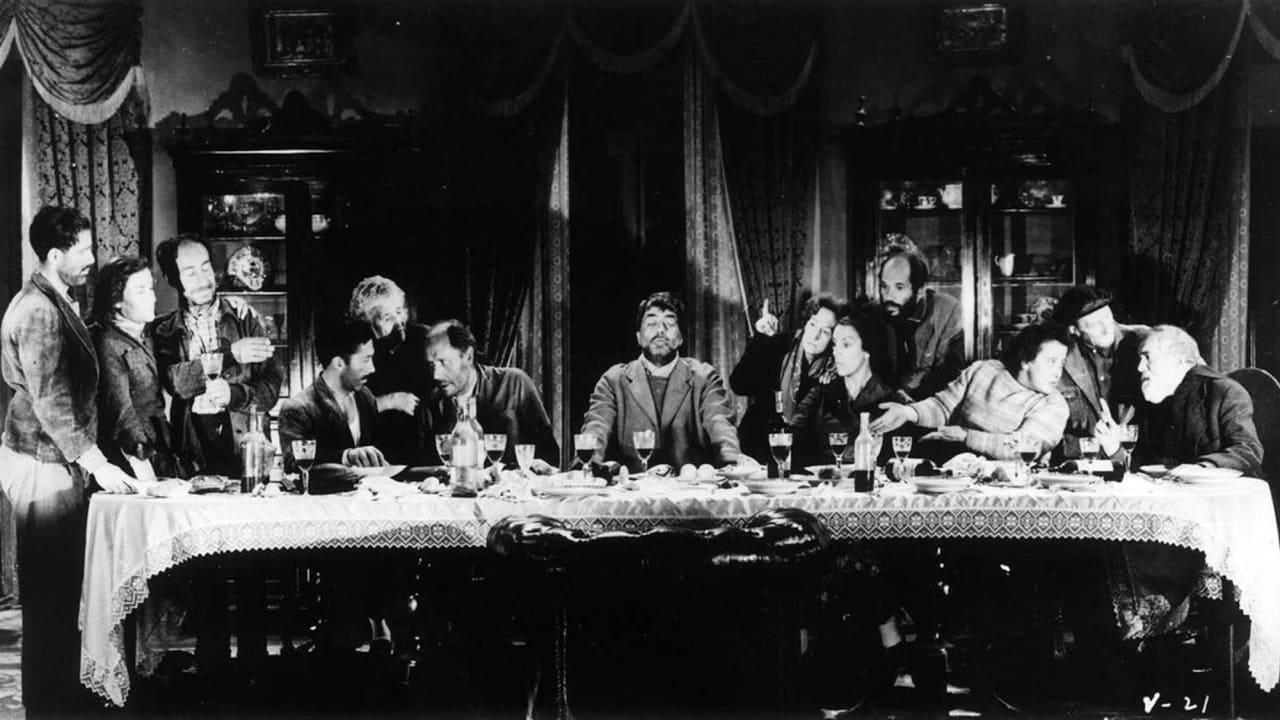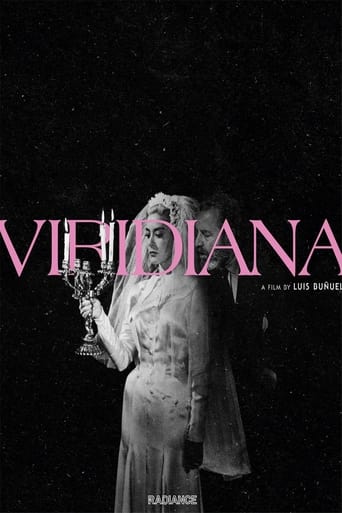

If you don't know a thing about the time this flick was made then you will think what is all the fuss about because it's 90 minutes of blah blah. That's correct but if you place it in it's era then I can understand that the church tried to ban this flick.Not that it is shocking or so but it was made by Luis Buñuel, a director living in exile and in 1962 Le Peuple (newspaper) made an effort to say he should bee seen by a psychiatrist. It was his first flick made in Spain and controversial it became even seen for a long time as a lost flick. But here it is.The flick was the Spanish entry for the Golden Palm but the Vatican tried to stop that. They succeeded in some way because it was lost in Spain for 16 years. Due a novice playing the main lead it's there where the catholics found their blasphemy. Somehow I can understand that the people aren't impressed by God after all in this flick that what makes it hard to take back then. I won't recommand it for those who think it's all about Satanism or whatsoever, it isn't. But the novice being drugged by her uncle and being undressed (just some cleavage) was shocking and controversial. Overall, a bit of a demonstration against religion to show that not everybody is impressed by religion. Only for those seeking out some Mexican-Spanish history. Gore 0/5 Nudity 0/5 Effects 0/5 Story 3/5 Comedy 0/5
... View MoreBunuel is, for me, the most original and creative filmmaker from Spain. I love all his films, including those from his Mexican phase which are meant to be poorer but are not. Viridiana is a beautiful transition between his Mexican films and his European period (in fact, Viridiana is a co-production and the actress is a Mexican star). The film is extremely beautiful, and this is just magic, for Viridiana is about the darkest aspects of human behaviour. Poverty, selfishness, the impossibility to change things to make the world a better place... all this and much more too is found in this film. And, yet, you love all the shots, beautifully arranged. The endings is intriguing and invites you to see Viridiana many more times.
... View MoreRegardless of the inhibitions that it may engender, it's always a matter of great cachet and honor to review the work of a virtuoso like Luis Buñuel. Calling Buñuel merely a movie-maker would not only be an understatement but also an invidious remark. Buñuel was a pioneer in every sense of the word and his works avant garde and highly influential. He is regarded as the father of surrealism in cinema and his predilection for the morbid and the obscure had earned him the tag of a 'fetishist'. Buñuel's directorial debut, Un Chien Andalou, a prototypical work on Surrealism, is a living example of Buñuel's vision and imaginative genius as a movie-maker and more importantly as a student of cinema. Buñuel was averse to explaining or promoting his work and ironically his surrealist works are so personal, distinctive and elaborative in style and manner that no one but Buñuel was worthy of judging or explaining them. Fortunately for me the first Buñuel movie that I have ventured to review does not deal with surrealism. Viridinia is a story of a young nun whose inexorable resolve for redemption ironically takes her to the brink of moral corruption. Viridinia revolves around bourgeois (middle class) modus vivendi and deals with controversial themes of gluttony, blasphemy and adultery which have been an integral part of Buñuelesque oeuvre. Buñuel was a staunch maverick and fittingly his iconoclastic works relentlessly flouted the bourgeois morals and the very root cause of bourgeoisie plight - the conservatism and hypocrisy camouflaged in the preaching of Catholicism and Christianity. Viridiana not only stands equal to the task of mocking organized religion and hypocrisies associated with it but just like other Buñuel works also manages to bring in a humanistic element with a somber yet sensual touch. The questions that Buñuel manages to pose through Viridiana are so straight and naked that even a saint of divine proportions, or a champion of human rights will not only look askance in want of candor but will also be forced to squeal in ghastly terror while trying to answer them. Such was the impact of Viridiana on the The Roman Catholic Church that the Vatican's official newspaper published an article calling Viridiana an insult to Catholicism and Christianity. The movie was banned in Spain and all its prints were destroyed as per the orders of the Spanish autocrat, Francisco Franco. These exaggerated responses were clearly not responsive of the subject material that Viridiana showcased but were the mere consequences of the questions it posed and the answers that it demanded.Viridiana is a young nun on the verge of taking her final vows. She is asked by her Mother Superior to pay a visit to her estranged uncle, Don Jaime, who has repeatedly expressed his keenness to meet Viridiana. She remembers that her uncle was never there for her whenever she had needed his support. Despite the absence of an emotional urge, she decides to pay him a visit simply out of courtesy. Don Jamie is a recluse rotting in the abject solitude of widowhood, which is making him more vulnerable and desperate with each passing day. Upon meeting his nubile niece, he notices a striking resemblance to his deceased wife. This ray of hope reinvigorates a new sense of purpose in his life as he decides to put forth a marriage proposal in front of Viridiana. He implores her to wear his wife's wedding dress which she reluctantly obliges. When his maid, Ramona informs Viridiana of his intent to marry her, she is appalled, and Don Jaime appears to have dropped the idea. However, Ramona secretly drugs Viridiana drink and Don Jamie carries the unconscious Viridiana to her room with the intention of raping her, but falls short of doing the ignominious. The next morning, he bluffs that he has made her his, and hence she is no longer pure enough to return to the convent. Seeing her undeterred, he concedes the truth, but fails in convincing her fully. Viridiana immediately leaves for the convent but at the bus stop the authorities reveal her that Don Jamie has committed suicide and has left his entire property to her and his illegitimate son, Jorge. Deeply disturbed, Viridiana decides not to return to the convent. Instead, as an act of penance, she brings home an assemblage of beggars and devotes herself to the moral education and feeding of this underprivileged lot. The things become a bit more complicated on the arrival of Jorge who shows a strong inclination for Viridiana. What ensues is a series of amazingly bizarre yet poetic sequences which can best be cherished through viewing rather than description. The penultimate scene depicts the beggars posing for a photo sans camera around the table in which they seem to collectively resemble the figures in Da Vinci's Last Supper; a chair substitutes for the door which now cuts into the fresco, and removes Christ's feet. This scene, in particular, earned the film the Vatican's opprobrium. The controversial finale adds a completely different dimension to Viridiana elevating it to new levels of cognitive interpretation. In a nutshell, Viridiana is a truly fascinating cinematic experience catapulted to new heights of magnificence by Buñuel's mastery and his unflinching ability to depict the sad and abysmal reality of living under the influence of false and misconstrued religious tenets. Viridiana along with The Diary of a Chamber Maid (1964) are great means of acquainting oneself with Buñuel's oeuvre and can serve as an excellent mock exercise to prepare oneself before exploring Buñuel's exceedingly challenging surrealistic works. 10/10http://www.apotpourriofvestiges.com/
... View MoreA young and very naive nun named Viridiana (Silvia Pinal) reluctantly leaves her convent to visit her estranged uncle, a lecherous man named Jaime (Fernando Rey). With the help of his maid, Jaime tries to violate the helpless Viridiana. This leads to a dramatic outcome, after which the nun, defying all reason or logic, stays at Jaime's mansion. Here, she opens up shop to a dozen or so paupers whom she tries to help, goodhearted soul that she is. But the paupers take advantage of her generosity while she's conveniently away. They throw a wild party in Jaime's big house.Although the film's high-contrast B&W lighting is competent, the story is incompetently bifurcated. The Jaime segment is unrelated to the pauper segment. Except for the presence of Viridiana in both, there's no real plot continuity. In essence, we have two separate stories held together by a central character who becomes the victim of unrelated villains. The film's plot structure is thus poorly conceived.The film's acting, editing and other technical components are adequate, but hardly outstanding. "Viridiana" is really a rather dull movie. Its only claim to fame is its none-too-subtle attack on religion.The paupers' party at the long table in the big room satirizes The Last Supper. This specific plot point, together with the general attitude the film takes toward Catholicism, got the film banned in Spain until 1977, and denounced by the Vatican, probably to Director Bunuel's everlasting delight ... a cinematic martyr.The anti-religious theme thus carries the weight of the film's import. In most other ways, the film is mediocre and drab. At times, it conveys a vaguely menacing Gothic undertone. At other times the film seems ludicrous. Overall, I cannot recommend this film, apart from its somewhat interesting history at the hands of a repressive Spanish regime.
... View More